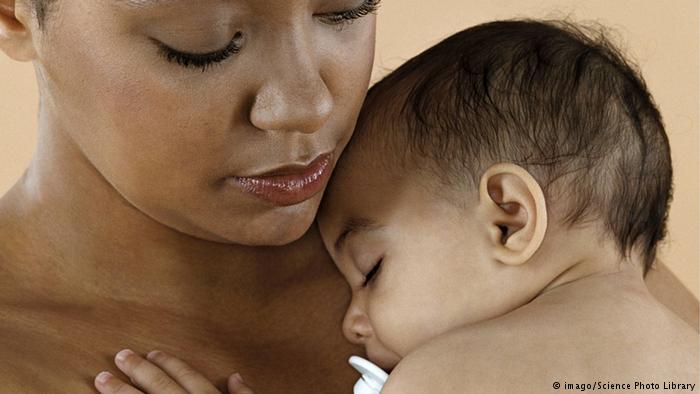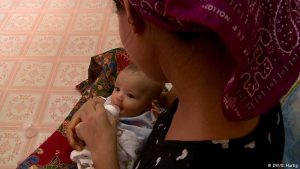Motherhood: Fantasy vs Reality

Postpartum depression is a reality that haunts women all over the world. Immigration and cultural factors may only aggravate its effects.
Manvi and her husband, new immigrants to Canada, had desperately hoped for a child. Manvi’s joy knew no bounds when she gave birth to a baby girl last summer. At first she was ecstatic, but what followed after about a month did not correspond to the usual glowing motherhood experience she had dreamed of. Suddenly, the Instagram picture of hers (with the clichéd caption – ‘motherhood the best job in the world’) seemed like a farce.
The 27-year-old gradually went into a denial mode and no longer harbored any maternal feelings for her infant. Painful and biting, breast feeding wasn’t a trouble-free experience. Sleep-deprived, exhausted and with little support, she developed feelings of hatred and indifference for her child. She stopped looking in the mirror and wouldn’t take a shower for days. She would lash out at her husband and scream expletives at him. Moreover, she started developing worrying thoughts about harming her child.
 Postpartum depression is a global reality, which is receiving more and more attention. “Worldwide about 10% of pregnant women and 13% of women who have just given birth experience a mental disorder, primarily depression,” says the World Health Organization. “In developing countries, this is even higher, i.e. 15.6% during pregnancy and 19.8% after child birth. In severe cases mothers’ suffering might be so severe that they may even commit suicide. In addition, the affected mothers cannot function properly. As a result, the children’s growth and development may be negatively affected as well.”
Postpartum depression is a global reality, which is receiving more and more attention. “Worldwide about 10% of pregnant women and 13% of women who have just given birth experience a mental disorder, primarily depression,” says the World Health Organization. “In developing countries, this is even higher, i.e. 15.6% during pregnancy and 19.8% after child birth. In severe cases mothers’ suffering might be so severe that they may even commit suicide. In addition, the affected mothers cannot function properly. As a result, the children’s growth and development may be negatively affected as well.”
Studies in Canada have shown that immigration effects on mental health are particularly strong during and after pregnancy, a period of increased susceptibility to depression. They show that immigrant women present a predominantly high level of depressive symptoms during pregnancy, the early postpartum period and as mothers of young children. Immigrant women are more vulnerable to postnatal depression due to a lack of money and support. Immigration has an impact on a person’s cultural identity, social support and socioeconomic status and this, in turn, is likely to have a bearing on immigrants’ mental health. The government of Canada reports that overall 13% of women have little or no support available to them during their pregnancy.
In to the April issue of Glamour magazine, the model Chrissy Teigen became the latest in a series of celebrities to discuss her struggle with postpartum depression. She joined Adele, Gwyneth Paltrow, Brooke Shields and other well-known women who have brought attention to this serious condition.
Many women feel ashamed to speak about the complicated feelings they experience after pregnancy for fear of being judged.
 Maria, an immigrant from the Philippines, is an hourly wage contract worker in Winnipeg. After giving birth to a son, she encountered “ambivalent” feelings towards her baby. On one hand, she wanted to return to work immediately, while at the same time she experienced a sense of guilt for her ambitions. She desperately waited for a daycare slot. “I wanted to return to my previous image – a full-time working woman. But I was worried if I was ignoring my child? Am I not a ‘good mother’? I felt guilty of putting my own needs over my child’s. I constantly felt I wasn’t the ideal mother. I spent most of my time crying and ultimately had to seek help,” she points out.
Maria, an immigrant from the Philippines, is an hourly wage contract worker in Winnipeg. After giving birth to a son, she encountered “ambivalent” feelings towards her baby. On one hand, she wanted to return to work immediately, while at the same time she experienced a sense of guilt for her ambitions. She desperately waited for a daycare slot. “I wanted to return to my previous image – a full-time working woman. But I was worried if I was ignoring my child? Am I not a ‘good mother’? I felt guilty of putting my own needs over my child’s. I constantly felt I wasn’t the ideal mother. I spent most of my time crying and ultimately had to seek help,” she points out.
In many societies, cultural and misogynistic patterns may aggravate depression in many young mothers. For instance, preference for the male child, domestic violence, poverty, pressures within joint families, a lack of support and relationship problems (with spouse and in-laws) have been reported by many women as triggers of depression. Among these, son preference and family dynamics seem to be the crucial ones. If a girl is born, the mother may face low self esteem and blame the infant for the reproach from her family members. Ravinder, 26, an immigrant from Punjab, gave birth to a baby girl, the second one in succession. “My mother-in-law came down from India to help me. But after the birth of my daughter, she was upset. I had to take care of my elder daughter single-handedly and took little rest after my caesarean. My stitches opened when I was giving a bath to my elder child. I was again admitted to the hospital. I was so dejected that I had to ultimately seek help for depression.”
 According to a new study, fewer girls than boys are born to Indian women who immigrate to Canada, especially those whose mother tongue is Punjabi. One of the most astonishing findings of the study, published in the Journal of Obstetrics and Gynecology Canada, is that the preference for boys does not decrease even if women from India have lived in Canada for a long time. According to Indian media reports the 2011 census found a sex ratio of 940 females to 1,000 males. Affluent states such as Delhi and Gujarat reported child sex ratios of 871 and 890 girls to 1,000 boys, respectively.
According to a new study, fewer girls than boys are born to Indian women who immigrate to Canada, especially those whose mother tongue is Punjabi. One of the most astonishing findings of the study, published in the Journal of Obstetrics and Gynecology Canada, is that the preference for boys does not decrease even if women from India have lived in Canada for a long time. According to Indian media reports the 2011 census found a sex ratio of 940 females to 1,000 males. Affluent states such as Delhi and Gujarat reported child sex ratios of 871 and 890 girls to 1,000 boys, respectively.
Post-partum depression is not only the result of various hormonal and chemical changes in women’s bodies because of pregnancy and childbirth. The romanticized notions of motherhood also contribute to a range of post-partum illnesses. The huge psychological and physical impact of childbirth is only exacerbated by a host of social, cultural and economic factors. Our societies sometimes fail to recognize women’s autonomy over their own bodies. Meena lives in a joint family with her in-laws in Winnipeg. She visits new-mom support groups to help deal with depression. With the birth of her son, she also experienced a sudden change in the relationship with her husband. “There is always a belief that the baby brings a couple closer. But my husband and I, on the contrary, are always fighting. I always feel a burden of expectations – to be the ‘perfect’ mother who sacrifices everything for the sake of her child. As a young mother, I am always trying to negotiate my own space within the family of my husband,” she says.
 In many developed countries, including Canada, there is some help available for post-partum depression. From the time a baby is born, a new mother is made aware of the symptoms of depression and the assurance that medical help is available for her. Canada has joined the US and Australia in the largest international postpartum depression (PPD) study to date. It uses smartphones and ‘spit kits’ to collect data and DNA samples from women who have suffered from PPD and postpartum psychosis (PPP). The goal is to gather information that will help in understanding the genetic link between postpartum depression and postpartum psychosis.
In many developed countries, including Canada, there is some help available for post-partum depression. From the time a baby is born, a new mother is made aware of the symptoms of depression and the assurance that medical help is available for her. Canada has joined the US and Australia in the largest international postpartum depression (PPD) study to date. It uses smartphones and ‘spit kits’ to collect data and DNA samples from women who have suffered from PPD and postpartum psychosis (PPP). The goal is to gather information that will help in understanding the genetic link between postpartum depression and postpartum psychosis.
The study of postpartum depression shifts focus from impossible motherhood standards to leaking breasts, dirty laundry and sleepless nights. The sexy image of a happy mom - who is a multitasker and practices pre-natal yoga – may just be a fiction after all. So, even when the spotlight still remains on the baby, a study of postpartum/pregnant mothers can lead to better parenting and healthier societies.
*Some names have been changed to protect identity.
Author: Divya Kaeley (Winnipeg, Canada)
Editor: Anne Thomas
_____
WTO RECOMMENDS
Women Immigrants Battle Their Fears Of The Unknown
Winnipeg, Canada – it’s a new world, a new journey. But instead of becoming the exciting experience it ought to be, it ends up being more about fending off unwanted fears of the unknown. Every new immigrant to Canada has to live through the three stages of acculturation, which for most is not easy. First comes the thrill and joy of exploring a new land, then there are feelings of marginalisation and hostility towards the host country and finally comes acceptance.
Marred happiness: a case of post-partum depression
We don’t accept the severity of situations until we find ourselves in tough spots. Some of us remain silent while others seek help. I choose to write about it. I didn’t expect it would happen to me, until it did. I’ve been struggling to cope up with post-partum depression (PPD) since the birth of my son last month. It’s been six weeks and it continues, with its severity ranging between low to sometimes traumatically high.
A perfect mum vs a perfectionist mum
I have a daughter who is 17 months old. She is bright-eyed and bushy-tailed and full of wonder, usually running in the face of danger and always in search of adventure. As her mum, I love her free spirit even though it is tiring to chase after her when she ventures away from the playground in search of something more. Raising her away from the land I was raised in has brought about its own set of challenges.



